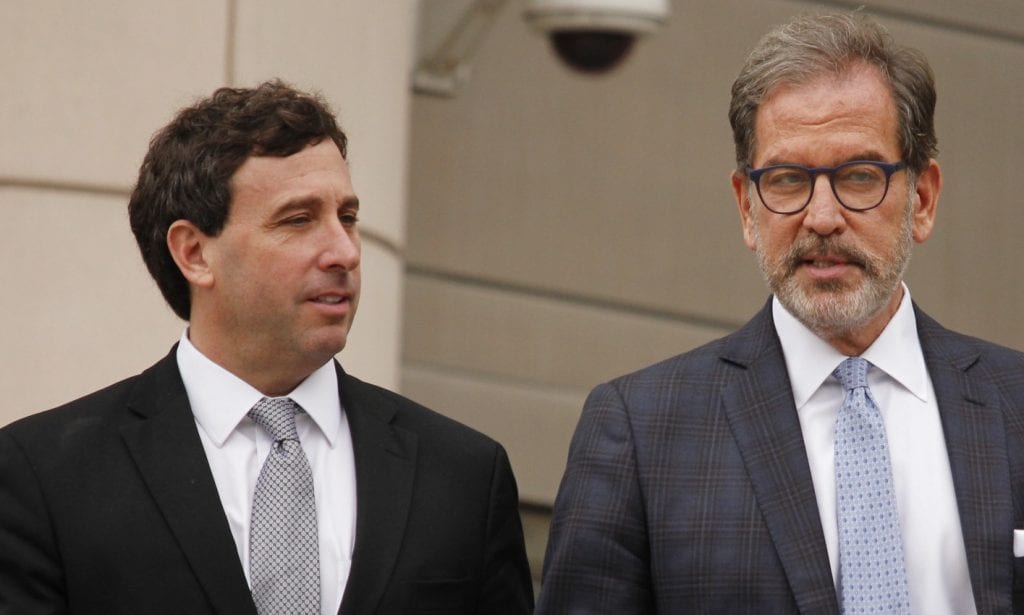By Gloria Lloyd
News Editor
glorialloyd@callnewspapers.com
In the span of five days last week, Steve Stenger went from St. Louis County executive to a felon who is likely headed to federal prison for public corruption.

Stenger pleaded guilty last week in a plea deal with a recommended sentence of three to four years for a sweeping corruption scheme that permeated county government, as he commanded department heads and the head of the city-county joint economic development agency to steer county contracts to his campaign donors so that he could stay in power.
The Democratic county executive, 47, resigned minutes after an indictment a federal grand jury handed down April 25 was unsealed Monday morning, April 29. He pleaded not guilty at his arraignment later that day, while agreeing to voluntarily give up his law license.
But he pleaded guilty in “United States of America v. Steven V. Stenger” Friday morning, May 3, acknowledging that everything federal prosecutors alleged in the 44-page indictment was true. (Read his plea deal.)
It was a stark contrast to the image Stenger had painted of himself as a fiscal conservative who brought order and budget cuts to county government after 11 years of former County Executive Charlie Dooley, whom he defeated in 2014 after six years representing South County’s 6th District on the County Council.
Last year, he said to The Call, referring to the County Council’s investigations into some of his donors’ county contracts, “Look at all the investigations we’ve had in the last year. What’s been found? Nothing. And it’s because there’s nothing there. We run a really tight ship, and we run it light.”
Voters appeared to agree at the time, but unbeknownst to Stenger, the FBI had already been investigating him for five months. Assistant U.S. Attorney Hal Goldsmith said that the yearlong investigation was kept undercover to not interfere with either of Stenger’s elections last year.
Before a federal subpoena was issued to the county March 21, Stenger was seemingly on top of the St. Louis political world, despite a council that fought him every step of the way on his initiatives for the last two years.
Stenger won re-election last year to a second four-year term, and with the help of the proposed city-county merger of St. Louis County and city, he was lined up to stay in office without having to run again through 2025, pending approval of voters statewide next year. (Update: The merger was called off Monday in light of the Stenger guilty plea and opposition to a statewide vote.)
Better Together set up the plan so that Stenger would serve as the proposed megacity’s powerful “Metro Mayor,” with his current term extended for two years to ease the transition to the new government. Detractors called him “King Steve,” but Stenger said it was all for the greater good of St. Louis. He would have even written the new combined city’s charter.
Now, as a convicted felon, Stenger may not even be able to ever vote again, on the city-county merger or anything else.
Prosecutors accuse Stenger of five schemes violating the public trust. Four revolve around businessman John Rallo, who over four years repeatedly pestered Stenger to give him county contracts in exchange for Rallo’s $10,000 a year in campaign donations. Overall, Stenger amassed more than $4 million in his campaign account for county executive for last year’s races against Democrat Mark Mantovani, then Republican Paul Berry III.

The indictment chronicles events starting in October 2014, when Stenger was running for county executive, to November 2018, when he went on a profanity-laced tirade against the CEO of the St. Louis Economic Development Partnership, Sheila Sweeney, for refusing to go along with his demands to give a law firm a state lobbying contract. At first, events are described generally, then through text messages, and finally, conversations last year are quoted verbatim in conversations captured at his office and house.
Stenger first met Rallo at a dinner at Sam’s Steakhouse in Affton Oct. 23, 2014, when Stenger was just weeks away from defeating Rick Stream in the 2014 general election for county executive. They were introduced by one of Rallo’s closest friends, a mutual friend the indictment only identifies as “S.W.,” but which the Post-Dispatch identified as Sorkis Webbe Jr., who had himself gone to prison in the 1980s for a cable-television franchise scheme.
At the meeting, Rallo paid for Stenger’s dinner, gave him a $5,000 campaign donation and complained that in the past, he had repeatedly given campaign donations and yet couldn’t get anything from politicians in return. Stenger promised Rallo that he would help land him county contracts if Stenger was elected county executive.
“It’s good to have friends;-),” Rallo texted to Stenger May 9, 2015, after meeting with one of Stenger’s staffers May 6 to talk about getting a contract.
It was a relationship of mutual admiration. On Jan. 18, 2017, Stenger texted Rallo, “U r a beautiful man” after Rallo said he had recruited his business partner as a Stenger donor.
For the first several years of his time as county executive, Stenger pursued switching a county insurance benefits contract to Rallo’s company Cardinal Insurance, a scheme that apparently never went through due to intervention from then-Administration Director Pamela Reitz.
That didn’t go over well with Stenger, who told Wagener July 24, 2016, that Reitz was “either tired or just not our friend. Either way I really want her gone ASAP…. I am absolutely done with her. As soon as a replacement can be found I want her gone.”
With the insurance contract on the backburner, Stenger turned to other ways to enrich Rallo that actually succeeded. First, he got Sweeney, who also served as executive director of the St. Louis County Port Authority, to push a $100,000 marketing contract through the Port Authority board for Rallo and his friend Montel Williams, allegedly to help rehab the county’s reputation post-Ferguson. But Rallo didn’t have any marketing experience, and no work was done on that contract other than an op-ed from Williams that even misspelled Stenger’s last name.

Sweeney increased that contract to $130,000 without board approval so that she could launder money through Rallo to pay $30,000 to “J.C.,” a political operative friend of a politician unnamed in the indictment who had come through for Stenger with a key endorsement in the 2014 election. The description of the politician matches U.S. Rep. William “Lacy” Clay, who represents the city of St. Louis and North County, and the Post-Dispatch identified “J.C.” as John Cross, a Clay associate. This particular scheme is where federal prosecutors allege mail fraud, since Rallo mailed three checks to Cross.
Rallo also wanted to buy two parcels of county-owned land in Wellston for business ventures. Stenger directed Sweeney to help Rallo buy the land through the Land Clearance Redevelopment Authority, which Sweeney was on the board of. Sweeney put the sites out to bid, proofed the bids ahead of time for Rallo and his partner, Corey Christanell, and told them how much to bid based on whether anyone else was bidding. The county had spent several million dollars clearing, grading and preparing the properties. Rallo and his partner bought the sites for $256,000 and $275,000.
After Post-Dispatch reporter Jacob Barker submitted Sunshine Law requests last year for information on the Wellston land deal, Stenger was caught on audio — possibly Rallo wearing a wire — saying, “You can’t talk to the f—-ing press. I bent over f—ing backwards for you, and I asked you one simple f—ing thing, don’t talk to the f—ing press. And I’m telling you, you’re gonna f—-ing kill yourself, all right, you’re gonna kill yourself with this s—.”
With federal agents again apparently listening in, Stenger outlined his philosophy on governance to his top staffers in November 2018, while discussing whether they could pressure Sweeney into approving the law firm, identified only as “Company One” in the indictment, that had previously held SLEDP’s state lobbying contract again instead of a competing bid from “Company Two.”
“I am a political person, I have to be, I’m in politics. That’s what we do. It’s not the art of f—ing over your friends,” Stenger said.
He later added, “It’s the art of staying in power. It’s about your agenda, and your administration, and (Company Two’s) not in my administration. Never got there. They’re an ancillary player. And (Company One) knows our issues, can get s— done.”
In the same conversation, he calls Sweeney a “nightmare b—-” and said “if she’s going the wrong thing on this, I’m firing her before she makes the decision. Seriously, we can’t have that.”
If she chose Company Two, the board would reverse her because “we’ve got too many people on the board.”
He added of Sweeney, “I’m about this close to just pulling the trigger and saying get the f—- out of here” and “(Sweeney’s) a political creature, she was appointed by a politician, and by people who were appointed by politicians to take this role. She took the role. Now you’re in it. You’re either going to do it or you’re not. Get the f— out. You’r a political person.”



















